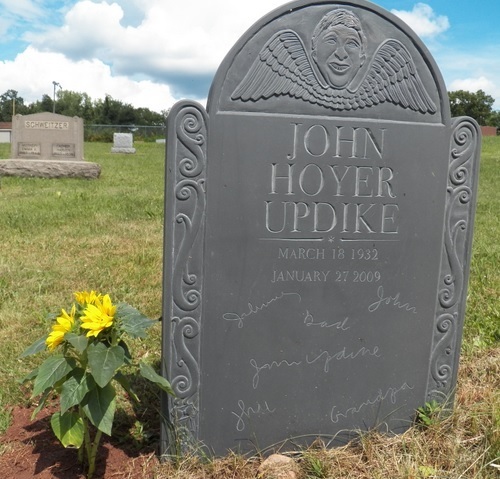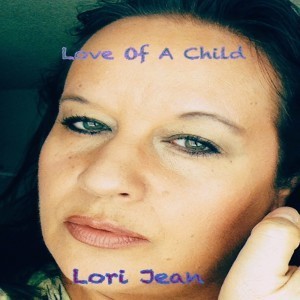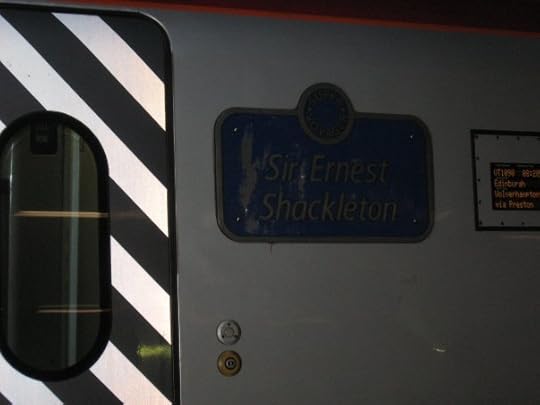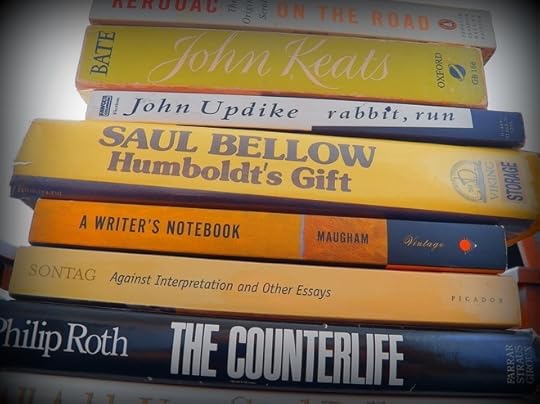Christy Potter's Blog, page 9
June 29, 2014
Christy Writes: Planting Sunflowers for John Updike
A few months ago, when I visited John Updike’s grave in rural Pennsylvania for the first time, I noticed there were no flowers, nothing save for the beautiful headstone carved by one of his sons. I know his family doesn’t live nearby so I certainly understand their inability to get there very often – I live far from where my own loved ones are buried – but I couldn’t stop thinking about that unadorned grave, surrounded by others that were decorated with flowers, flags, and other trinkets that sparkled in the sun or turned gently in the breeze.
I had the same thoughts when I visited again. It was inconceivable to me that the final resting place of a writer of such magnitude should be so… alone.
“Whitney Houston’s grave has a 24-hour armed guard,” I said indignantly to Guy. “And Updike’s doesn’t?”
“Not everyone has the same heroes you do,” he responded. Yeah, well…
Not that I wanted armed guards around Updike’s grave, mind you, as they would doubtlessly have put an end to my habit of leaning against his headstone and ranting to him about the difficulties of the fiction process, the New York publishing world, and Philip Roth.
While reading through some of Updike’s lesser-known poetry shortly after that, I encountered his poem called “Sunflower.”
Sunflower, of flowers
the most lonely,
yardstick of hours,
long-term stander
in empty spaces,
shunner of bowers,
indolent bender
seldom, in only
the sharpest of showers:
tell us, why
is it your face is
a snarl of jet swirls
and gold arrows, a burning
old lion face high
in a cornflower sky,
yet by turning
your head, we find
you wear a girl’s
bonnet behind?
That’s when I knew what I wanted to do. I found an email address for one of his sons, the one who had made the headstone, and wrote to him to ask if I could plant sunflowers at his father’s grave. The note I got back was so kind it almost had me in tears. He thanked me for the thought, and told me that I not only had the family’s blessing to plant the sunflowers, but that he and his siblings would water it when they’re in town to visit this summer and fall.
So late last week, I planted sunflowers at John Updike’s grave. I chose a small variety, so they won’t tower over everything and be destroyed by seed-greedy birds, and put them to the side, where they won’t obscure the beautiful headstone. As I sat on the ground, digging in the cool, rain-softened Pennsylvania soil with my trowel, I told him I’d brought him a present, and that I’d chosen the sunflowers in honor of his poem, and because they also happen to be the state flower of my native Kansas. I knew he’d appreciate the coincidence.
When the flowers were in the ground and I had watered them, I assumed my usual spot and told him how nice his son had been to me, that I would so love to hear his thoughts on the changes in the publishing industry over the past few years, that I’m making huge headway in my latest novel which was inspired by his book “The Centaur,” and that Philip Roth says he has written his last book, which, yeah, sure, like that guy’s ego is ever going to let him stop writing. Then I sat quietly, the summer sun on my face and the country breeze in my hair, and found myself wrapped in a feeling of gratitude that although I never met the writer himself, his novels, his short stories, and his poetry have made him more familiar to me than if I had ever been able to shake his hand. That’s a writer’s true gift, and his to me. Bringing him sunflowers was just my way of saying thanks.
The post Christy Writes: Planting Sunflowers for John Updike appeared first on Christy The Writer.
June 25, 2014
Christy on the Road: Pass the American-to-English Dictionary, Please
One of the first things I discovered when I visited Great Britain was that there’s more of a language barrier than I expected. I’d been very bold about it when I was planning my trip, telling people I’d sensibly chosen my first overseas visit to a country where they speak English.
My first night in England, I sat in a pub talking with a few locals. While I found their accents charming and adorable – can you squeeze an entire nation’s cheeks at once? – I wasn’t aware they were wrestling with MY accent until one of my companions finally pulled out his iPhone and announced that he was just going to download an American-to-English dictionary.
Apparently there’s an app for me.
One of my conversations during my trip went like this:
“Do you want a biscuit?”
“No, no thanks. Wait, that’s a cookie.”
“A cookie?”
“Yes, that’s not a biscuit. That’s a cookie.”
“It’s a biscuit.”
“We call those cookies. That’s not what we call biscuits.”
“Oh, right. Well, what do you call biscuits then?”
“A biscuit is bigger. Soft.”
*Blank look*
“It’s made of flour and egg, you know, round. You eat it warm with butter and jam.”
“That’s not a biscuit, that’s a bloody scone!”
“A bloody scone? Who are you, Sweeney Todd?”
Food names seem to be a particularly big hang up, as I found out after another exchange went like this:
“So what do Americans call chocolate?”
“Uh… chocolate.”
“Yes, but if I give you a box of individual pieces of chocolate, say, with a creamy center, what are those called?”
“Oh, I see what you’re saying. Those are candy. It’s a box of candy. Or sometimes people say a box of chocolates.”
“You know that makes no flipping sense at all.”
“Sure it does.”
“So what do you call boiled sweets then?”
“Boiled sweets?”
“You know, sugar boiled until it hardens. Flavoured, wrapped individually…”
“Oh, that’s candy.”
“So chocolate is candy. And boiled sweets are candy.”
“Right.”
“That’s insanity.”
“Well what do you call candy?”
“The normal things. Boiled sweets. Turkish Delight.”
“And chocolate?”
“Well, that can be a bar, you know, Cadbury and such. But it’s often a drink. In a cup.”
*Blank look*
“You know, like breakfast chocolate.”
“Riiiiight.”
It’s more than just the names for things that trumpet the gigantic differences between American English and British English. It’s the whole way of presenting the language. Our “Don’t Litter” becomes “Please use the bin” over there. “Watch your step” is “Mind the gap.” It’s a softer, gentler, more polite English. Well, except for signs for the bathroom. Ours say “Restroom” or “Ladies.” Theirs have an arrow and the single word “Toilet.”
“What is that about?” I asked one of my British friends, pointing to the sign.
“What d’you mean?”
“It says ‘toilet.’”
“Yeah?”
“Doesn’t that seem a bit… blunt?”
She looked confused.
“But it’s a toilet.”
It’s hard to argue with logic like that.
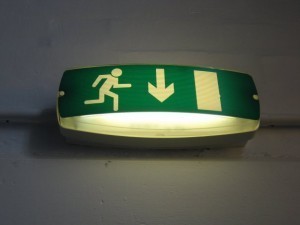
It took me six days to figure out this is an emergency exit sign.
The post Christy on the Road: Pass the American-to-English Dictionary, Please appeared first on Christy The Writer.
June 10, 2014
Christy Writes: When The Voice Won’t Shut Up
I’m waist-deep into my newest book, and it is a radical departure from my previous two books. Consequently, I’m spending a lot of hours and mental energy on it, which means I’m also spending an inordinate amount of time dealing with The Voice.
You know the one I mean. The one that pipes up at inopportune times and says stuff that distracts you or makes you question yourself. No one likes dealing with The Voice, but it can pretty much be the kiss of death for me when I’m writing. Let me show you what I mean.
Me: *writing away industriously*
The Voice: What in the world does that mean?
Me: Quiet, I’m just trying to get this thought down. I’ll edit later.
The Voice: I sure hope so, because if that hot mess of a sentence goes to print, they’ll be doing a Saturday Night Live sketch about you within the week.
Me: I said be quiet.
Me: *writing away again*
The Voice: We need a snack.
Me: We do not need a snack.
The Voice: Fine. But don’t blame me when your blood sugar drops and you get the shakes.
Me: Given that the giant bowl of Lucky Charms an hour ago was your idea, I really don’t think it will be an issue. Now be quiet.
Me: *writing away again*
The Voice: Hey, you should go check the mail. I think there might be checks in the mail today.
Me: If there are checks in the mail, they’ll still be there later.
The Voice: Yes, but if there are, you should probably get them in the bank before 3:00. You know, since you’ve written 83 checks in the past week and not remembered to put any of them in your checkbook register.
Me: IT’S FINE. Now be quiet!
Me: *writing away again*
The Voice: Are you sure you should be writing this book in the first person?
Me: I am twenty chapters in. I’m not changing the voice now.
The Voice: First person is tricky. You can’t get into other characters’ heads at all.
Me: I wish you would get out of my head.
The Voice: Ha. Good luck with that. Although if you get me a snack when you come back from checking the mail, we may be able to negotiate.
Me: I don’t know why you think I’d ever listen to you anyway.
The Voice: You used to listen to me.
Me: Yes. Yes, I did. And as a result of listening to you over the years, I bought not one but two lousy cars based solely on the fact that I liked the color, tried four different colleges, married the wrong man, and once dyed my hair so black I made small children cry in the street.
The Voice: Haha, yeah. Good times.
Me: So you’ll have to forgive me if I don’t listen to you now.
The Voice: You’ll be sorry.
Me: I’ll risk it. Now be quiet.
Me: *writing away again*
The Voice: I don’t know why you think anyone is going to want to read a book like this anyway.
Me: Because it’s different.
The Voice: It’s different because nobody’s writing books like this. Hey, here’s a thought: maybe writers aren’t writing books like this because people don’t want to read books like this.
Me: You don’t know what you’re talking about.
The Voice: Fine. I don’t know what I’m talking about.
Me: So we’re in agreement. Good. Now be quiet.
Me: *writing away again*
The Voice: Did you ever wonder if maybe you should have been a painter instead of a writer?
Me: No. Now be quiet.
The Voice: Writing is hard. The field is really competitive.
Me: So is painting. Now be quiet.
The Voice: At least with painting, I wouldn’t have to read a sentence like the one you just wrote. Is that even English?
Me: I might be able to write better if you’d be quiet.
The Voice: I doubt that.
Me: Listen, you. I am writing. I am a writer, ergo I write. I don’t need your distractions or your criticism. If you were an app I could uninstall, I’d have done it ages ago. Now for the last time, shut up so I can write.
The Voice: FINE. Fine. You don’t have to be such a jerk about it. You won’t hear another peep out of me.
Me: Good.
Me: *goes back to writing and enjoys ten blissful minutes of silence*
The Voice: Is it time for a snack yet?
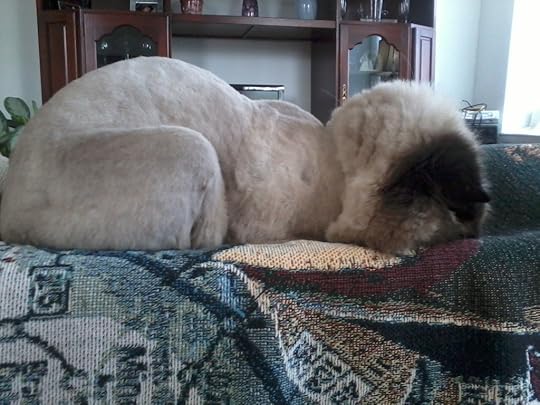
The Voice makes us all tired…
The post Christy Writes: When The Voice Won’t Shut Up appeared first on Christy The Writer.
June 4, 2014
Going Gray: with Guest Lori Jean, Singer, Songwriter, Survivor
Meet Lori Jean. She’s a singer, a songwriter, a mother, and a survivor. A stalker nearly killed her with a bullet to the head three years ago, and in her weeks and months that followed, she not only recovered physically, but she discovered a new passion for music.
Click on the player below to hear my interview with Lori Jean, or download the episode for free in the iTunes store.
The post Going Gray: with Guest Lori Jean, Singer, Songwriter, Survivor appeared first on Christy The Writer.
June 1, 2014
Christy with a Camera: On the Riverfront

The River

Handprints

Rocks

Bridge

Shadows

Summer sky
The post Christy with a Camera: On the Riverfront appeared first on Christy The Writer.
May 31, 2014
Christy Writes: On the Power of the Human Spirit
I’ve been contemplating, in ever-deepening ways, the human spirit. Not in a spiritual, after-death sense, but a life sense. A living sense. I am mystified and fascinated by how some people, no matter what they’ve endured, forge ahead. They survive, they grow, they reach in, they reach out, they speak up. Others can’t manage it.
I’m making these observations, thankfully, only as a spectator. My share of life’s heartaches and headaches has been blessedly common, the types that everyone knows they’ll have at some point. I’ve lost loved ones, been laid off from jobs, had financial difficulties, seen friendships collapse. What others have suffered is beyond what I can imagine. Maya Angelou was raped and abused by her mother’s boyfriend when she was eight years old, and the ensuing trauma left her mute for five years. Yet she went on to become the kind of inspiring, stabilizing, unifying influence on the world that people of all ages, races, genders and nationalities felt the pain when she died this week. It was as though we all lost our favorite grandma.
On a more personal level, I’ve known people who have overcome staggering odds to become not only okay, but amazing. I’ve known others who have given up after finding, for whatever reason, the fight not worth fighting. What is the difference between these two outcomes? What drives one person in one direction, and the other in the complete opposite?
Writers, naturally, love to tackle this subject. They explore, they expound, they (bless ‘em) pontificate, but the truth is, no one knows the answer because there is no real answer. In his book “Herzog,” Saul Bellow says “You have to fight for your life. That’s the chief condition on which you hold it.” In the same book, he says “Unless you’re completely exploded, there’s always something to be grateful for.” Maybe that’s really what it all comes down to. Like encountering a piece of driftwood to cling to in the middle of the ocean, maybe it’s about finding something, anything, to be grateful for.
I remember reading, years ago, an interview in which Jerry Lewis said he’d once been so desperate that he literally had a gun pointed to the roof of his mouth when he heard his children laughing as they played outside. That was his moment of gratitude, his driftwood. People who suffered unthinkably in the September 11 attacks, people who lost limbs in war, people who have buried their children, people who have every reason in the world to withdraw, to lash out, or to just give up and end it all but don’t… those are the people who, for me, define the very essence of the human spirit. Those who can’t overcome, well, they are also an important cog in the wheel. They show us our frailties, they show us the other possible outcome, and if nothing else, they teach us to reach out to each other in love, in support, and in the non-judgmental realization that it could so easily be any one of us in that position.
I don’t pretend to understand what it’s like to come back from something catastrophic, and frankly I hope I never understand it. All I know for sure is that those who persevere in the face of all that could so easily bring them down have my eternal respect and admiration and give me hope that, no matter what rains down on us, we can choose to overcome.

New World Trade Center, NYC
The post Christy Writes: On the Power of the Human Spirit appeared first on Christy The Writer.
May 21, 2014
Christy’s Celebs: Jon Anderson talks music, family, and Yes
Thirty years ago, “Owner of a Lonely Heart” by Yes was our jam. It had that synthesizer and distorted guitar sound, the musical hallmark of the mid 80s, but it was the words we seized hold of. Awkward, boyfriendless, and on the cusp of womanhood, my friends and I sang it. We belted it. We felt it.
“See yourself… You are the steps you take. You and you and that’s the only way…”
To our angsty teenaged souls, it was empowering, cathartic, anthemic, and probably the first time since our hormones blossomed we managed to believe we didn’t need to be in love to be happy.
“Owner of a lonely heart… much better than a… owner of a broken heart…”
I still know every lyric. I still crank it up when it comes on the radio. And I said as much to Jon Anderson, whose distinctive vocals helped make that song a rock classic, during a recent telephone interview. In fact, I told him, just that morning the 70s station had played “Roundabout,” and not an hour later, the 80s station played “Owner of a Lonely Heart.”
“You guys have got some serious staying power,” I told him, as if informing him of something he didn’t already know. Ever the polite Englishman, I could hear his smile when he said “That’s good to hear.”
What surprised me the most about talking with Jon Anderson was not that I liked him – I’d already heard he was affable and approachable – but how much I liked him, and how quickly. He’s warm, engaging, and clearly comfortable in his own skin. It made me glad my 15-year-old self had listened to what he had to say.
To call it an interesting interview wouldn’t do it justice. It was a conversation, a revelation. We talked about life, love, and music. We talked about family, Yes, and America. He is refreshingly candid, touchingly honest, and Britishly witty.
Take a straight and stronger course to the corner of your life…
Me: I grew up in the 70s with young, hip parents who listened to popular music, and I was a teenager in the 80s, so that means you’ve always been a part of my musical consciousness. That’s pretty impressive.
Jon: You know, we didn’t even think about hit records, we were just thinking about making music for the stage. We were very into performance. That’s where we started – playing for people. Secondary to that, you try to make a record that gets on the radio. Yes never had that many hit records.”
Me: A bit like the Grateful Dead.
Jon: Yes, exactly. I’d say we’re in good company.
Go closer, hold the land, feel partly no more than grains of sand…
Me: You’ve wanted to try some things over the years that didn’t always set well with people with whom you were working – recording in the woods, for example, or putting tiles up in the studio to simulate the sound of recording in the bathroom. The level of your creativity has always blown me away. Talk about how you come up with these ideas and what drives your creativity.
Jon: I had spent time in the countryside, and heard the birds, the music of the trees and the birds, the energy of the earth, the music of the earth. After we’d done a few albums in the studio all I wanted to do was create a big tent, with the generator below ground and out of the way, and make music there. The guys thought I was crazy. So instead I got some cutouts of cows and ducks, put them around the studio, scattered some hay … they thought it was funny but they loved it. And we made some really great music. I’m so thankful for what I do.
Me: Many musicians include you on the list when they are discussing their influences. Who influenced you?
Jon: I grew up with the Beatles, of course. My brother and I already singing, we were in a band, when saw the Beatles on stage in ‘63, and they were amazing. From that moment on, I just wanted to be a Beatle. Then I started listening to Paul Simon, and Nina Simone. I really enjoyed the Beach Boys, Frank Zappa, Buffalo Springfield.
Me: You had some scary health incidents in 2008. Tell me about that and how it affected your work.
Jon: It was a strange year. I nearly died a couple of times. In the spring I had a serious asthma attack – I literally stopped breathing for two minutes before I was resuscitated. I’d also been sick for three or four years, just coughing a lot. I went to so many specialists, but no one could figure it out. It finally got really bad, so went to Stanford where I had several operations over seven months, but it cleared up. I can’t even explain how it felt, the release of the pain and frustration.
Me: I can’t even imagine.
Jon: While I was in the hospital recovering, a man was going about playing guitar, trying to spread a little cheer to the hospital’s patients. He was at my room and started playing and singing “What a Wonderful World.” I couldn’t stop crying. I was just so grateful to be alive.
Me: Did he have any idea he was playing and singing in front of Jon Anderson from Yes?
Jon: No, he didn’t know. And I didn’t tell him.
Me: But while you were sick, and then recuperating, you were fired from Yes. From the band you co-founded. They went on without you. That had to be hard.
Jon: They did carry on when I got really sick. They just wanted to get on with it. It was hard, but I let go. It took awhile, but I’m doing solo shows around the world now. I just have a joyful life.
Me: I can’t imagine Yes without your voice fronting them.
Jon: Well, then they’re not Yes anymore, are they?
Me: Touché.
Touching of the healing heart, so this is where we really start…
Me: I love the touchy feely stuff, so let’s get a bit more personal for a moment. You have three adult children – tell me about them.
Jon: My oldest daughter is a filmmaker, she has a movie that’s recently been on Showtime called “Aroused.” She writes great music too. I have a son who is 42 and he’s just… he’s just one of those guys. He has a beautiful soul. The girls just queue up. We’ve written about six songs together over the last couple of years. My youngest daughter is modeling in London. She’s also a songwriter and has a beautiful voice. She just had a little boy a year ago. They are in London, but we’re all actually meeting up soon in Maui, and he’ll run around and drive us all crazy.
Me: Your health – healthy eating, not smoking – and your spiritual life are, from what I’ve read, very important to you. Tell me a bit about your practices and how they keep you performing at your peak.
Jon: I have a strong feeling about meditation. I really enjoy that calmness. Morning and evening, and before I go on stage, I just stop. Stop the world. That’s been for the last 25 years now. It’s an amazing feeling to have that connection with what we call the divine. We’re all spiritual beings, but we sometimes forget and rely on outside influences to dominate. And that’s nothing to do with the reality of who we are.
Me: After a long time of living in the US, you became an American citizen. Congratulations – welcome to the… uh… party? Jungle? I’m not sure. Tell me why you decided to become a citizen.
Jon: I’ve been here 25 or 26 years. I met a beautiful girl, we got married 20 years ago, and I’m here all the time, so I figured I may as well get my passport. It’s a great country, I really believe in it.
Me: I’ve heard it said that people who move here and become citizens appreciate America on a whole different level than those of us who were born here.
Jon: I think that’s probably true. America is important to the whole world. I love it here.
Me: So getting back to music – what are you working on now?
Jon: Constant creation.
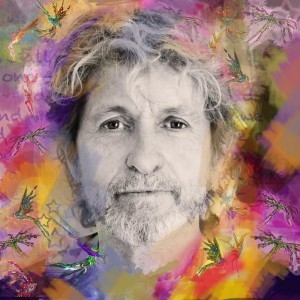
Jon Anderson (Photo by Deborah Anderson)
The post Christy’s Celebs: Jon Anderson talks music, family, and Yes appeared first on Christy The Writer.
May 19, 2014
Christy with a Camera: May 2014

World Trade Center, NYC
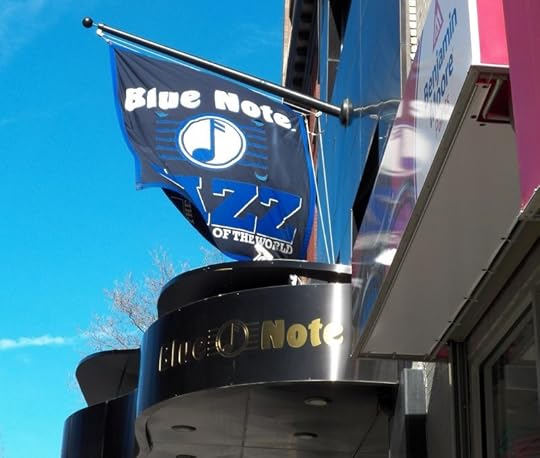
Blue Note Jazz Club, NYC
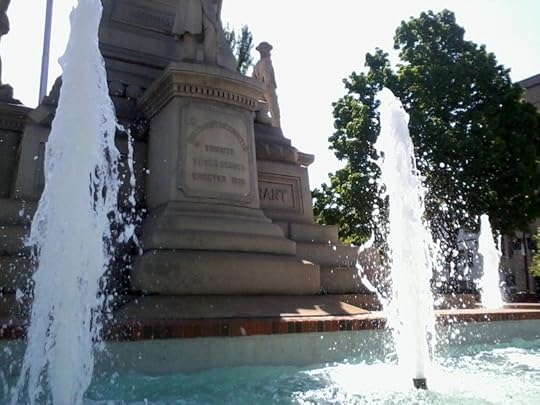
Centre Square Fountain, Easton, PA
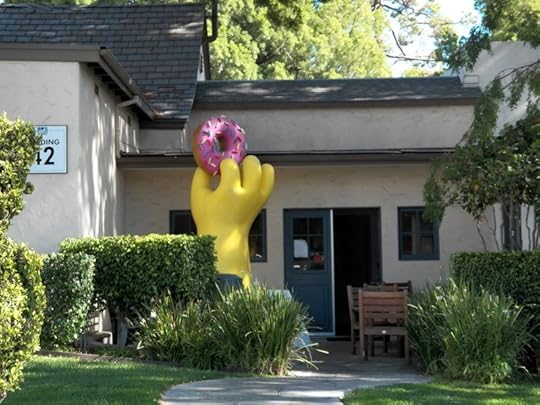
Mmmmm…donuts. 20th Century Fox, Los Angeles, CA
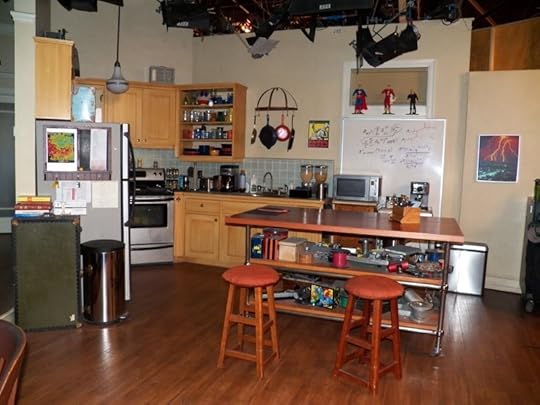
Big Bang Theory set, Warner Bros., Los Angeles, CA
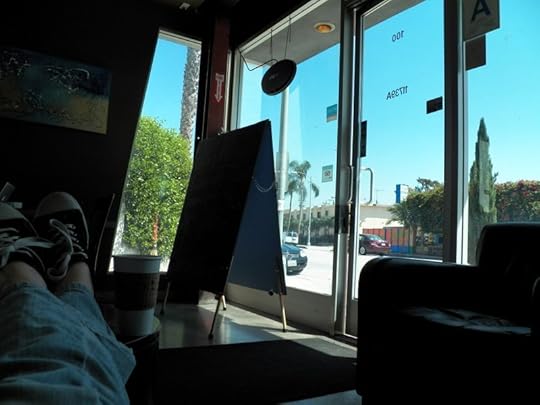
Coffee House Chillout, LA
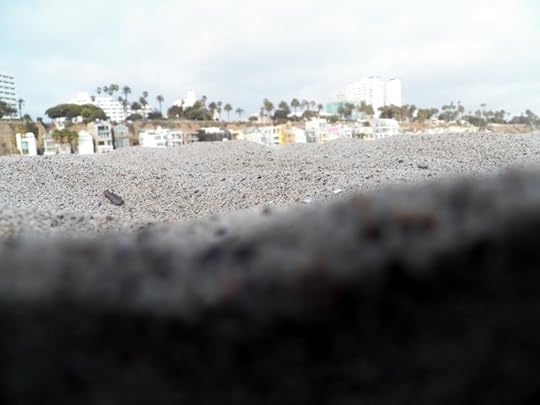
Buried in the sand. Santa Monica Beach, CA
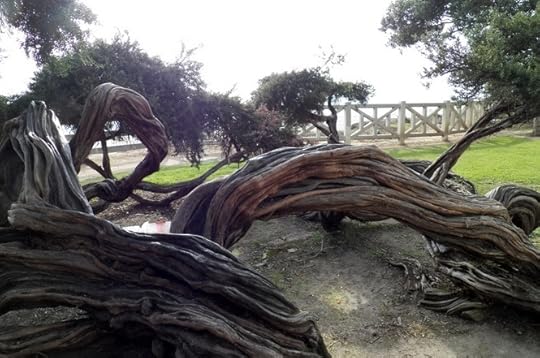
Gnarly tree. Santa Monica beach, CA
The post Christy with a Camera: May 2014 appeared first on Christy The Writer.
Christy on the Road: Birmingham, England
I was three days into my stay in Great Britain when I decided to venture out of the safety of Birmingham, which had quickly become as wonderfully familiar to me as if I’d lived there for years. Directions, supplied by the attractive bell captain at my hotel (yes, it’s important that I mention he was attractive, do you not know me at all?) in hand, I made my way to the train station.
I went through the double doors and looked around for a gate or a ticket booth, but found neither. There weren’t many people, either. I smiled at a nearby man and he smiled back, clearly wondering what I was doing pivoting slowly in a circle in the middle of a big empty space. (Please note that in New York, this would not be considered odd behavior at all.)
“Where can I buy a ticket?” I asked him.
“Usually there’s a kiosk in here where you can buy one, but it’s Sunday now, you know,” he said. He seemed genuinely apologetic that the British mass transit people would dare to inconvenience me this way. “You need to go down the stairs just there, and then you cross over the walkway and you pop up again on the other side. You just kind of pop up, you know. And then you’ll see the main concourse.”
Naturally by now I’d fallen deeply in love with this man.
Following his directions, I went down the stairs, crossed over, and popped up again on the other side. I just kind of popped up, you know. And sure enough, I was on the main concourse. This part of the train station was teeming with people, all going in different directions at warp speed. I again looked around for a ticket counter but still didn’t see one. Not too far from me I could see a man in a uniform leaning against the wall talking to someone. He was cartoonishly tall and lanky, with a kind face. Had he been wearing a bowler hat and doing a silly walk, I’d have thought he was John Cleese.
I had no idea how tall he actually was until I approached him. I tugged on his pant leg and he looked down at me.
“Well, hello there,” he said.
“Hi, uh, can you tell me where I can buy a ticket?”
“Where did you come from?”
“Where did I … come from?”
“Yes,” he said. “Where did you come from?”
“Uh … America?”
“Okay, very good. Now, how did you get to England from America?”
“Um, on a plane?”
“Good, good. And to which airport did the plane bring you?”
“Uh, Birmingham International?”
“Splendid. And when you came out of the airport, how did you get to your hotel?”
“I took a taxi?”
“Wonderful! And when you left the hotel today, how did you get here?”
“I, um, I walked?”
“And when you walked did you come straight here?”
“Yes! What are you getting at?”
“You shouldn’t be able to get onto the main concourse without a ticket. Since you’re here, I figured you must have come in by train from another destination. That’s what I’m trying to figure out.”
“Oh,” I said. “Well, why didn’t you just to ask me that to start with?”
“But I did,” he said. “When you said you came from America, I just assumed you were giving me a thorough accounting of where you’d been. And it’s been my pleasure to listen to your adventures.”
By now I couldn’t stop laughing, and he was inordinately pleased with himself. He pointed in the direction of two people sitting behind a table.
“Go see my mate over there, and he’ll get you a ticket. You may have to repeat your story for him, but if you need me to back you up, just wave me over. Cheers then!”
I thanked him, bought my ticket and got on the train, still cracking up.
The next day I was bound for Wales, to meet up with my friend Trisha Ashley and some of her writer friends. I went back to the train station and went through the same door. This time there was a ticket table set up right inside, so I went over and got in line. When it was my turn, the ticket seller looked up. It was the same man. When he saw it was me, he covered his face with his hands.
“At least I’m sitting down for this today,” he said. “Okay, where did you come from?”
The post Christy on the Road: Birmingham, England appeared first on Christy The Writer.
May 17, 2014
Christy Writes: Studying with Saul Bellow
For the past few years, I’ve wanted to take graduate courses, maybe get a master’s degree, in creative writing. I haven’t, however, and it’s more than just taking on more crippling student loan debt that has held me back. That’s just a practicality, a technicality, a checkbook reality. The truth is I don’t want to take a class in which a professor will tell me whether he likes what I wrote or not, if my voice is emerging correctly, and whether it’s okay for me to bend the rules of writing. Like sentence fragments.
Still, I know there is much room for growth in my writing, and I do find that it gets better when I read, and not just read but really study, the writers I admire most (John Updike, Philip Roth, Susan Sontag, Jonathan Franzen, Joan Didion), and even those current prodigies I really don’t understand the appeal of (Donna Tartt, Jonathan Safran Foer). Their writings have been celebrated, lauded, and read, read, read. They have much to teach me, and with everything they’ve written that I read, I learn something. Sometimes it’s as simple as “Wow, that was really terrible,” but more often than not, they broaden my thinking, stroke the writing part of my brain, challenge me, make me angry, make me laugh… but above all, they show me what’s possible. They tell me not to be afraid to push myself, to try something new, to break the rules and spit on convention, to close my eyes, put my head down, and run like hell toward the goal.
So I typed the above paragraph into Google to try and find a writing course or two in my area, and came up empty. I know, right? Weird. So I decided to take matters into my own hands – if there wasn’t an adult school or university out there that could give me what I want, I’d create it myself.
I sat down and made a list of authors I want to study more in depth. From there, I worked out a year’s worth of study plans, with two months at a time dedicated to each author. I chose two books for each – including their prize-winning novels if they have them – and any interesting secondary writings on them I found.
That finished, I left space to make notes of particular themes I find in their work, or ideas they inspire in me, and gave myself the assignment of a half-hour a day of freewriting based on those themes or ideas. The most important part of this course, however, is also the most intangible: how what I learn from these masters will infiltrate my own work, subtly influencing not only how I write, but how I define myself as a writer. As Stephen King puts it, you can’t expect to blow anyone away with your writing until you’ve had it done to you.
By now I was excited. First-day-of-school excited. I headed out in the rain for the half-mile walk to my local library where the reference librarian helped me unearth two books by my first assigned writer, Saul Bellow. We talked a bit about his mind-blowing success (the Nobel and the Pulitzer, anyone?) while she got them from the shelves, and by the time I left I was so elated I splashed through the puddles and soaked my skirt and my sandals and found it the most poetic soaking in the history of rain.
The books, of course, I carried in my arms, against my chest. At one point the wind shifted and encouraged the rain to slip under my umbrella, and I moved them as though I were sheltering Bellow himself, keeping him away from the invading drops. The rain could have its way with me, but it couldn’t touch him, not right now, not when I was on the precipice of learning what he has to teach me.
This will be the most exciting writing course I’ve ever taken. I can’t wait to get started.
The post Christy Writes: Studying with Saul Bellow appeared first on Christy The Writer.

